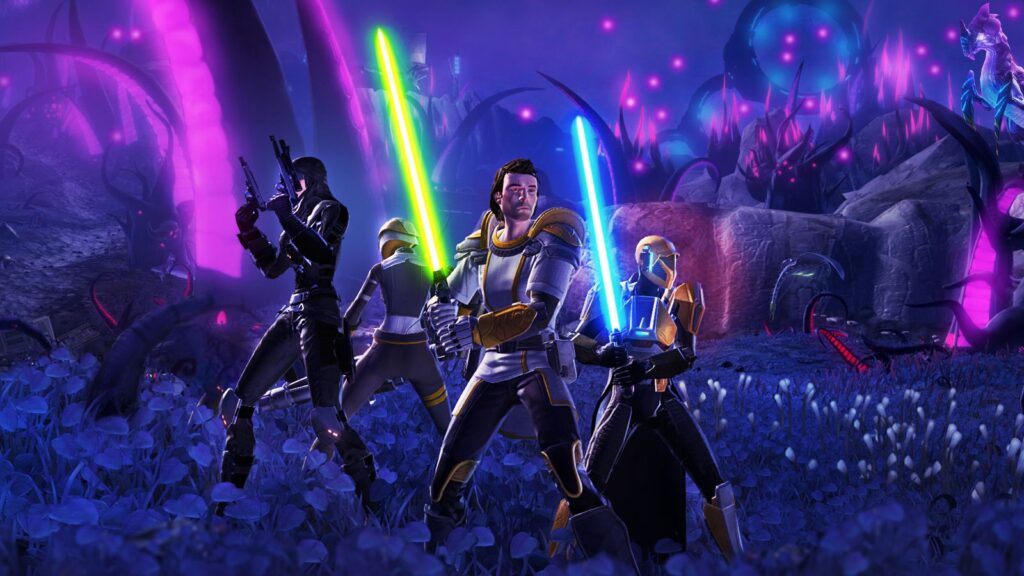
Think back for a second – what was the first free-to-play (F2P) game you played? How long ago was it? It’s likely less time than you think. F2P may seem old hat as a business model today, but it was only 5 or 6 years ago that the majority of games on mobile app stores were considered “premium”. Now, it’s almost risky to release a title for $5 on iOS or Android. And while F2P once had a stigma (thanks in part to “gacha” monetization schemes), consumer concern over the business model has all but evaporated. In fact, according to monetization design expert and current Boss Fight Entertainment Design Director Damion Schubert, we are only witnessing the beginning of the new F2P era of gaming.
“Honestly, free-to-play games earn much, much better revenues than games with a one-time premium fee. That’s just the economics of that,” Schubert told me bluntly.

One might assume that F2P can only thrive in the mobile space, but it would be foolish to think that high-end PC and console titles can’t succeed with the free model. Digital Extremes’ Warframe is a solid example of AAA production levels brought to consumers with an appealing F2P model. Schubert predicts that we’re going to see many more F2P games in the near future, and that practically any genre out there can make the transition.
“Take a look at League of Legends. It comes out and sets an industry standard for how MOBAs monetize. You cannot possibly comprehend a game coming out now and asking for a box price for a MOBA. That is just a genre that has been flipped to be a F2P genre,” he noted.
“Similarly, MMOs, it’s possible you might have an additional box tail and hope to recoup that cost but it will be F2P with monetization… Several games have done it successfully,” he added referring to Star Wars: The Old Republic (which he led the transition on), Lord of the Rings Online, and others.
I think every single genre you can think of is prime for one company coming in with a great business model that blows the doors off the whole genre and effectively converts that entire genre to be a F2P genre. Because free is a really good price…
“There are models now that [companies] can go to that are ultimately kinder to the customer, and when you get something like that it’s really hard to do something that is more expensive. It’s going to get a smaller audience, it’s going to get harder to hit critical mass. I think every single genre you can think of is prime for one company coming in with a great business model that blows the doors off the whole genre and effectively converts that entire genre to be a F2P genre. Because free is a really good price…”
Schubert believes that there have been too many times where people have failed to get enough value from $60 titles. He said that around half the $60 games he’s purchased in his life, he’s only played for 30 minutes or so.
“I’ve been ripped off by a lot more premium games in my lifetime than F2P games,” he commented. “Whereas with F2P games, yes you might download a whole bunch of turkeys on your phone but the cost for you to do so is the time that it takes to download it and the time it takes to run through the tutorial, maybe.”
If that’s the case, then why do companies keep pushing out titles at high price points? One can argue that big budget games demand premium prices to recoup costs, but Schubert thinks it has more to do with the slow-to-change older generation that’s in charge of most game companies.
“A lot of the people from my generation are used to the old $60 model because we’re comfortable with it and we know it,” he remarked, “but kids these days are coming in from a world where they don’t have to pay for anything. It’s easy for them to get any song they want online, effectively for free from Spotify, any movie they want for free without even pirating anymore. It’s just an environment where it’s very easy to try before you buy, and so it’s a seismic shift in terms of not just gaming but all media. They expect to be able to have access to everything. I do think the shift in that direction is going to continue.”
Boss Fight Entertainment, spread across Austin and McKinney, Texas, is only a little over three years old, but already has seen success with its F2P game Dungeon Boss, a strategy RPG that lets players battle a litany of “epic bosses.” Co-founded by Bill Jackson, Scott Winsett and Dave Rippy, Boss Fight’s pedigree is nothing to sneeze at. Its members came from Ensemble (Age of Empires, Halo Wars) and went on to found Bonfire Studios (which was acquired by Zynga).
The developer just recently announced a soft launch of its next project — Anvil: War of Heroes, an action-strategy CCG, and Schubert is looking to further fine-tune his monetization approach. So what’s the key?
First, Schubert stresses that the team must trust the data. “I am really happy to be in a world where design doesn’t rule the day because designers are frequently wrong,” he stated. “A lot of designers – and this includes some of the best, most senior people I’ve worked with (I won’t name names) – have a difficulty imagining people who don’t play games the same way they do. So it’s like, ‘I play the game this way and everybody should!’ And it’s like, yeah, that’s great, but only 20% of the population plays it for that reason. The other people play it because of the combat or because they like breaking stuff. People have different reasons for doing that. The good news is that data really makes you humble really fast. It makes you start making decisions based on what players are doing.
He added, reflecting on his previous games, “Honestly, one of the more interesting surprises, especially when you get into game balances – this was true in Dungeon Boss [and] in Star Wars – it’s interesting to look at how the data is different from what the community is saying. What the community is saying and what the community is doing are very different. Very often, communities can be hijacked by charismatic idiots who are like, ‘Oh, hey, this class is overpowered.’ You look at it and it’s like, no, that class is actually losing all the time. So then you have to get into, is the perception wrong for reasons that we’re not seeing? You have to dig into the next level on that.”
That being said, Schubert does not trust data blindly. Data is a vital tool, but it doesn’t always answer the hard questions. Designers have a big role to play, because it’s part of their job to act as the translator. Raw data without context isn’t all that useful. But a skilled designer uses that data to reinforce design decisions along the way.
“There are things that are very hard to gauge from data,” Schubert affirmed. “So big, social systems are very hard to gauge from data because it can take weeks to play a game, right? So you can’t just put something in beta and [follow the data]. In MMOs, the crowd that plays a beta server may be very different from the crowd that plays on the mass market server, which tends to be more casual, and less plugged into the ins and outs of everything. So data is very good… But there are some things that are always about feel and some systems that are just hard to test with data.”
Where data is absolutely invaluable, of course, is in guiding monetization and engagement. Some designers may not like having to look at this data, but in today’s crowded marketplace it’s crucial for success. Schubert reminisced about one of the first instances of data-driven design 15 years ago in Dark Age of Camelot, before there was any such thing as an analytics team. The team found natural drop-off points when people stopped playing, except for one class, which fell off a cliff at level 25. As it turns out, every class got a really cool upgrade power, but the class that suffered from a drop-off was issuing a really lame power-up. Players decided it wasn’t worth it, so the designers had to ensure that class lines were rewarded equally.
So you have to find this balance between [servicing whales] … but it’s really important that the 98% is happy as well, because the 98% of the population is that game’s virality. That’s what free players are.
And that is another key to F2P success: player happiness. “To be honest, I care that enough people are spending money in my game to keep the lights on but as a game designer I’m really passionate about wanting people to be as happy as possible throughout the game experience. That’s the stuff that’s important to me,” Schubert asserted.
Respecting the player is one obvious ingredient to keep them happy, but generating excitement through regular events and updates is a great way to reinvigorate a player-base.
Over a year and a half into Dungeon Boss, and Boss Fight is still learning. “It’s a live product and we support it a great deal and still give players new content,” Schubert said. “We’d like to think that we’re continuing to get better at that, which is figuring out ways to monetize but also figuring out ways to keep those players happy, keep them engaged. A lot of live development inside of these sorts of games is actually driven around events and some new characters in particular, so figuring out how to do that in a way that gets people the most excited is sort of what you do. And do we learn from that? Absolutely. We have a year and a half of learnings from Dungeon Boss and if we had done some of these things on day one we would have made some different decisions.”
A fundamental lesson that Schubert has learned is “whenever possible err on the side of being kind to the customers.” Being kind engenders long-term loyalty, and without that a title is going to quickly fade into obscurity.
“If I sell you a hat for 99 cents, that’s really insignificant unless you and I have a long history of that [kind of] relationship,” Schubert explained, “and that means not only do you want to come back to the game on a long-term basis, but also that you have a fun enough experience both with the game as well as with the relationship with the company that you’re happy about making that spend.”
Even if a developer does everything right, team members shouldn’t be discouraged when the community barely spends. “I’m a firm believer of reminding both my monetization team and my design team that most players will never spend. And that’s okay,” Schubert added. “And that’s actually one of the things from watching the loot box debate is that most Overwatch players would never buy a loot box. They’ll take their free ones all day long, but most people when they buy a boxed product, they get the $60 version, they don’t get the DLC, they don’t open the loot boxes, they don’t get the season passes, and that’s okay.
“[Developers] forget that a lot of the customers are kids that are buying games with their lawn mowing money and they don’t have that extra income. We’re still trying to reach those people too. When I think about F2P games, in particular – and this goes for both mobile and MMOs – I really think about getting my games in the hands of as many people as possible because at the core, I’m a big hippie. I really like it that people want to play my games and I can give them the opportunity to do so.”
Just because players don’t spend doesn’t mean that they are unimportant. In a typical scenario, a game might see 2% of its base spending, and these “whales” keep the game afloat.
“So you have to find this balance between [servicing] this audience of people but it’s really important that the 98% is happy as well, because the 98% of the population is that game’s virality. That’s what free players are,” Schubert said.
One of the most transformative experiences for Schubert (and arguably his “claim to fame”) was to embrace the new F2P direction that EA mandated for Star Wars: The Old Republic back in 2012.
“I volunteered and I volunteered eagerly,” he told me. “I think the first reason was I thought it was something that I thought was the future of games… So I thought it was a good skill to have. Even more importantly – and again I worked on that game for six years at that point – I was afraid somebody else might screw it up.
“Monetization design is very, very tricky. It’s something where you’re particularly scared that somebody who is too stingy or too greedy might get the [reins] or that you might be taking direction from somebody outside the building. And to be honest, I’ve seen that in this industry before where a dev team didn’t want to work on a F2P version of the game they were working on but the mothership insisted on it. And so if you have a design team that doesn’t want to design the game to be F2P or to account for monetization, the mothership will make those decisions for you. And they will often make decisions that aren’t in harmony with how the design of the game wants to be made.”
In Schubert’s case, once his bosses at EA understood that he had a vision in mind for the new monetization plan, they let him run with it. The stereotypical big, bad EA was actually great to work for, he noted.
“I can’t think of anything where they forced us to make changes,” he offered. “I can think of a few places where my team forced us to make changes because we were perhaps being too greedy, but that’s part of the whole [process of] iterating and finding something that will work for the particular customer base. Overall, I’m very proud of how it came out, because not only was it a skill-set that our studio didn’t have before but you also have to think about it as we were rebuilding an airplane while it was in the air. We had a live player base; the people who were there were very happy with the game and we were very passionate about not changing the game that they loved.”

The biggest key to a successful transition, as you may have guessed, was to ensure that current subscribers at the time were not disrespected. “The way that we did it was we made sure that the subscribers would not lose anything in the transition, which is to say we weren’t going to make it so that if you’re a subscriber that you leveled slower or lost anything. In fact, you got more – and so on top of the subscription, we said we’re going to give you some free gems every month, and by the way we’re going to give you a big wad of free gems for every month you’ve been playing the game since before we were F2P.
“On the day of the transition, a lot of these people found that they had 3,000 or 4,000 gems to play with on top of a game that fundamentally didn’t change for them if they were subscribed. They thought that was awesome, and I forget if we doubled or tripled our daily logins, but all of a sudden raids and dungeons and PVP was firing again so they were really happy about that as well.”
The proof is in the pudding, as they say, and Schubert is immensely proud that SWTOR is heading towards its seventh birthday, which he commented is “pretty good for a game that a lot of the press was doom and gloom about.”
The pressure that Schubert and his team were under was enormous. After all, Star Wars is the biggest license in the world, and he was tasked with managing a huge dev team, working with a behemoth publisher, and there was tons of revenue at stake. It was evident that EA was highly sensitive to any discussion about the game and its transition. In my executive interviews with folks like Frank Gibeau and others for previous publications at the time, the exasperation with PR and management was palpable. All that said, Schubert remained focused. He maintains that the bigger problems stemmed from external forces.
“SW:TOR suffered from expectations that were unrealistic and a lot of that came from people outside of the organization itself,” Schubert asserted. “There was some analyst out there that said, ‘Every person on Earth has seen a Star Wars movie so you can think about that as a baseline.’ It’s like, ‘Yeah dude, that’s friggin’ crazy!’”
As much as Schubert takes great pride in what he accomplished, he’s not looking to join the AAA fray again any time soon. Working with a small team of savvy veterans at Boss Fight suits him just fine. And there’s something deeply satisfying about being indie and nimble.
“Getting into a realm where I could work with smaller teams again and be more agile, take some chances… It’s very, very hard to take some big chances once the budget gets up to nine digits, right? That was actually something that was very, very attractive to me,” he said.
 GameDaily.biz © 2026 | All Rights Reserved.
GameDaily.biz © 2026 | All Rights Reserved.